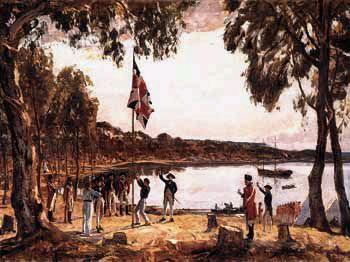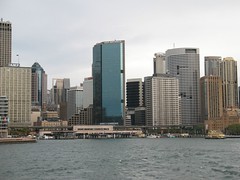Parts Unknown Beyond the Sea
 Two hundred & seventeen years ago this week the Second Fleet of ships carrying convicted criminals out from England's over-crowded prisons & hulks arrived here, in Sydney Cove.
Two hundred & seventeen years ago this week the Second Fleet of ships carrying convicted criminals out from England's over-crowded prisons & hulks arrived here, in Sydney Cove.They called it Port Jackson. New South Wales. The Cumberland Plain. The continent of New Holland, terra australis, the antipodes. It was the land of the Laughing Jackass Bird, now called the kookaburra.
They did not call it Australia.
In 1790 this was a place with no fixed name of its own.
Back home in England & Ireland, people called it Botany Bay.
But that’s 7 miles south of here. Even when this was understood—that Sydney Cove was just a much better location from the start—the papers kept calling it Botany Bay anyway. Those sentenced to exile—to Transportation, as it was called—were officially sent to “Parts Unknown Beyond the Sea.”
"Circular Quay" in 1788
I stand here along a jagged line of bronze disks embedded in the sidewalk around Circular Quay. The disks mark the original shoreline from 1788. I’m trying to imagine what it must have felt like to look at that the northern shore of Port Jackson knowing that there was absolutely no civilization as you understood it anywhere else on the entire continent. Odds are you’re a city boy, not given to walks in the woods. You ain’t never seen anything like this. Odds are you’re a teenager, too. Or barely in your twenties. Maybe you’re sentenced to be here for the rest of your life.
The Second Fleet was the most notorious ever to bring convicts to Australia. It was contracted by a company that ran slaving ships & the masters were paid only for every head that embarked, not for any head to land; almost a third of its convicts died. But not you. Somehow. When the survivors started their lives over again here, they started from death’s door.
There are no bars & few chains. If you wanted to sneak away, you could walk for days, weeks, even months in any direction, walk until you hit the ocean again, & all the way there you’ll find no one but the black wild men who carry spears & clubs like some prehistoric nightmare. It took you 6 months to get here if your ship was speedy & so even if you were inclined to run—to try for “China”, say, as some wiser sorts swear exists 5 days to the north—you’re half starved & badly out of shape. You’ve got scurvy for sure. Frankly, you’ve never been in the woods. And you’ve just seen a spider as big as your hand.
Maybe you’re literate, you might even be brilliantly clever, but you don’t know your geography here, because NO ONE knows the geography of this place. This place hardly even exists on world maps. It’s just the southern land mass that geographers always hypothesized MUST be there, because something had to balance out the land masses in the north!
The Dutch found the west coast. Then Captain Cook found the east. He hauled over, hopped out, took a pee, sniffed the botany, shot a wallaby & declared it a fine land indeed. His buddy made a book of pressed flowers & some awfully nice watercolors of pretty birds that in reality scrawk! at sunrise louder than any dawn rooster. And there are flocks of them.
You’d like to tell Captain Cook to kiss your fine ass indeed, to stick it up his Parts Unknown, this fine land indeed that His Excellency, governor Phillip, claimed for England TWO DAYS before the French arrived & conceded in a gentlemanly handshake that it seemed they’d missed their chance to claim the land for France.
Didn’t that part bode ill? Wasn’t that a little dodgy? That the French—the French—just shrugged, Aw shucks, lads, you beat us, we’ll just pick some flowers & be on our way? Best of luck with the penal colony? Didn’t Governor Phillip wonder at that handshake, just a little? A fine land indeed!
Maybe it didn’t happen quite like that. But you’re this 19 year old guy transported to 14 years Beyond the Sea for receiving a stolen candlestick, or something. Sounds good to you.
In 1788, parts of the country's coastline are still partially guesswork, mapped with dotted lines. On one map the cartographer has very gently described Man's ignorance by smoothly blending the tan-colored north coast into the ocean's blue. No one but the natives have been anywhere but the coasts & you don’t speak their language.
Wilderness looks very different when there’s nothing on the other side. The possibility of getting lost means something different, too. DARK means something different. Weird sounds in the night could mean anything at all. You don’t even recognize the stars; you are on another planet. This morning you heard someone remark that this view across the harbour is beautiful! You’d thought he’d lost his effing mind.
He’d called it Eden, this man.
He’d called the wild men the ‘unfallen’.
So we brought em a penal colony? What, to shove the unfallen over the edge as late-comers to sin, as mere dawdlers? There’s piety! You know Man isn’t supposed to come back to Eden. That’s like trying to climb back inside the womb. If that man is right, then there’s also an angel here set to strike us, for the only thing a sinner’s presence can augur is the Fall.
Of course, I’m eating a donor kebab as I’m thinking about all this. To my left the bustling wharfs trade ferries. A series of high fashion sales in the boutiques just behind me. There’s an aboriginal man in a red loincloth right here who’s painted himself with white stripes & accompanies hip-hop music on the dijeridoo for dollar coins.
Things have changed a bit.
Nevertheless, I’m here for one month to do some on-site research for the book. For the month of June, this is my job: right now, during the same weeks that my fictional characters arrive in this real place, I’m going to look at the land, the flora & fauna. I need to get a solid sensory impression. I need to locate some scenes in real places. To attend the giant annual Sydney Writers Festival. To talk with historians, visit botanical gardens, comb archives, tour museums & historical houses, meet some excellent writers & get a lot of specific questions answered. And finally: to make a plan for how to tackle the revision.
Circular Quay, Sydney Cove today



0 Comments:
Post a Comment
<< Home